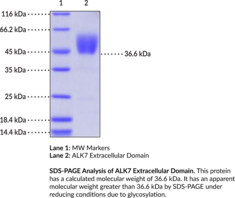Territorial Availability: Available through Bertin Technologies only in France
- Correlated keywords
- TGF? super family HEK-293 ACTR1C ACTRII SMAD
- Product Overview:
Activin receptor-like kinase 7 (ALK7) is a serine/threonine kinase and member of the type I TGF-? receptor superfamily that is encoded by ACVR1C in humans.{59948,59949} It is composed of an extracellular ligand-binding domain, a single transmembrane domain, an intracellular serine/threonine kinase domain, and a cytoplasmic serine/threonine-rich region.{54900,54901} Alternative splicing of the ACVR1C pre-mRNA produces a truncated isoform, tALK7, which lacks the first 50 amino acids of the full-length protein, and two soluble isoforms, sALK7a and sALK7b, which lack the transmembrane, kinase, and cytoplasmic domains.{59950} ALK7 is highly expressed in neuronal tissues, as well as intestinal tissues, pancreatic islets, and adipocytes.{59951,59952,59949} It heterodimerizes with activin receptor type 2A (ACTRIIA) or ACTRIIB, and upon ligand activation by activin A, activin B, activin AB, or Nodal, induces phosphorylation of SMAD2 and SMAD3 to regulate gene expression.{59951,54900} ALK7-mediated signaling has roles in insulin secretion and apoptosis, as well as roles in the suppression of tumorigenesis and metastasis.{59953,59954} ACVR1C SNPs are associated with increased risk of metabolic syndrome in women, and adipose tissue ACVR1C expression is decreased in obese individuals.{59949,59952} Cayman’s ALK7 Extracellular Domain (human, recombinant) protein is a disulfide-linked homodimer. The reduced monomer, composed of ALK7 (22-113) fused to human IgG1 Fc at its C-terminus, consists of 330 amino acids, has a calculated molecular weight of 36.6 kDa, and a predicted N-terminus of Leu22 after signal peptide cleavage. By SDS-PAGE, under reducing conditions, the apparent molecular mass of the protein is greater than 36.6 kDa due to glycosylation.
Cayman Chemical’s mission is to help make research possible by supplying scientists worldwide with the basic research tools necessary for advancing human and animal health. Our utmost commitment to healthcare researchers is to offer the highest quality products with an affordable pricing policy.
Our scientists are experts in the synthesis, purification, and characterization of biochemicals ranging from small drug-like heterocycles to complex biolipids, fatty acids, and many others. We are also highly skilled in all aspects of assay and antibody development, protein expression, crystallization, and structure determination.
Over the past thirty years, Cayman developed a deep knowledge base in lipid biochemistry, including research involving the arachidonic acid cascade, inositol phosphates, and cannabinoids. This knowledge enabled the production of reagents of exceptional quality for cancer, oxidative injury, epigenetics, neuroscience, inflammation, metabolism, and many additional lines of research.
Our organic and analytical chemists specialize in the rapid development of manufacturing processes and analytical methods to carry out clinical and commercial GMP-API production. Pre-clinical drug discovery efforts are currently underway in the areas of bone restoration and repair, muscular dystrophy, oncology, and inflammation. A separate group of Ph.D.-level scientists are dedicated to offering Hit-to-Lead Discovery and Profiling Services for epigenetic targets. Our knowledgeable chemists can be contracted to perform complete sample analysis for analytes measured by the majority of our assays. We also offer a wide range of analytical services using LC-MS/MS, HPLC, GC, and many other techniques.
Accreditations
ISO/IEC 17025:2005
ISO Guide 34:2009
Cayman is a leader in the field of emerging drugs of abuse, providing high-purity Schedule I-V Controlled Substances to federally-licensed laboratories and qualified academic research institutions for forensic analyses. We are certified by ACLASS Accreditation Services with dual accreditation to ISO/IEC 17025:2005 and ISO Guide 34:2009.





